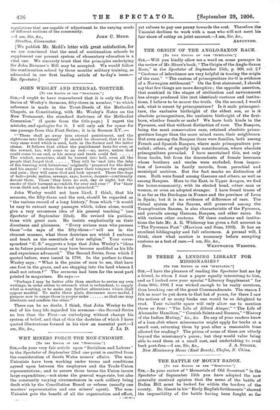• JOHN WESLEY AND ETERNAL TORTURE. [To THE EDITOR OF
THE "SPECTATOR."] SIR,—I ought to have remembered that it is only the First Series of Wesley's Sermons, fifty-three in number, "to which reference is made in the Trust-Deeds of the Methodist
Chapels, as Constituting, with Mr. Wesley's Notes on the ISTew Testament, the standard doctrines of the Methodist Connexion." (I quote from the title-page.) I regret the mistake, and apologise for it. I will only ask for space for one passage from this First Series; it is in Sermon XV. :—
" These shall go away into eternal punishment, and the righteous into life eternal.' It should be observed, that it is the very same word which is used, both in the former and the latter clause. It follows that either the punishment lasts for ever, or the reward, too, will come to an end:—no, never, unless God could come to an end, or his mercy and truth could fail. . . . . . The wicked, meantime, shall be turned into hell, even all the people that forget God They will be 'cast into the lake of fire burning with brimstone,' originally 'prepared for the devil and his angels': where they will gnaw their tongues for anguish and pain ; they will curse God and look upward. There the dogs of hell—pride, malice, revenge, rage, horror, despair—continually devour them. There they have no rest, day or night, but the smoke of their torment ascendeth for ever and ever !' For 'their worm dieth not, and the fire is not quenched."
John Wesley would not have liked, I think, that his sermons, the fifty-three and the rest, should be regarded as " the various record of a long history," from which "it would be easy to extract many passages which, taken alone, would give a very erroneous idea of his general teaching" (see Spectator of September 22nd). He revised his publica-
tions with great care. He insists emphatically on their directness and plainness. "Every serious man who peruses these "—he says of the fifty-three—" will see in the clearest manner, what these doctrines are which I embrace and teach as the essentials of true religion." Your corre- spondent "0. S." suggests a hope that John Wesley's "ideas as to future punishment may have become modified as his life and experience advanced." The Second Series, from which I quoted before, were issued in 1788. In the preface to these Wesley says "What is the praise of man to me, that have one foot in the grave, and am stepping into the land whence I shall not return P" The sermons had been for the most part printed in magazines. He says :—
"Perhaps I may be better able than another to revise my own writings, in order either to retrench what is redundant, to supply what is wanting, or to make any further alterations which shall appear needful. To make these plain discourses more useful, I
purpose now to range them in proper order so that one may illustrate and confirm the other."
There can be no doubt, I think, that John Wesley to the end of his long life regarded his sermons—the Second Series no less than the First—as embodying without change his system of belief, and that of this the doctrine of which I have quoted illustrations formed in his view an essential part.—I










































 Previous page
Previous page